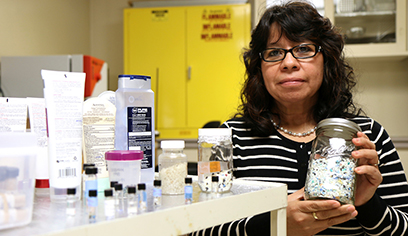
UW-Superior associate professor of chemistry Lorena Rios Mendoza gained national and international attention due to the unique work she and her team at UW-Superior are doing to understand the sources, impacts and solutions to increased plastics in oceans and the Great Lakes.
University of Wisconsin-Superior associate professor of chemistry Dr. Lorena Rios Mendoza, along with colleagues from UW-Eau Claire, UW-Madison and the Lake Superior National Estuarine Research Reserve, have been awarded a grant by the Freshwater Collaborative of Wisconsin to study microplastics in the St. Louis River Estuary and western Lake Superior.
“I am pleased because this research is essential to advance the knowledge about microplastics in our area, Lake Superior and the St. Louis River Estuary,” said Rios Mendoza. “I have been researching the density of microplastics in this area since I arrived at UWS.”
Rios Mendoza gained national and international attention due to the unique work she and her team at UW-Superior are doing to understand the sources, impacts and solutions to increased plastics in oceans and the Great Lakes. Microplastics, microbeads and plastic fibers, are being found in water worldwide. These tiny plastics attract toxins, are eaten by aquatic bugs and fish and make their way up the food web to our dinner plates. Rios Mendoza and her plastics research was involved with legislation in Wisconsin that bans microbeads in the water.
The more than $40,000 in grant funds will help support Rios Mendoza, two undergraduate research assistants, project supplies and travel expenses from May 18, 2021, to June 30, 2022, while the team collects samples through a program titled “Microplastics; Sources, Fate, etc. in St. Louis River Estuary and Lake Superior.”
“Working with colleagues in different research fields made this project more robust,” said Rios Mendoza. “This multidisciplinary research project will contribute to training undergraduate students in freshwater education. I am seeing this as an opportunity to fill some knowledge gaps of microplastics and involve our students in this study area. This is an opportunity not just for me working with colleagues from UW-Madison and UW-Eau Claire, but also for my students who can have the same opportunity working with students from other UW campuses.”
Rios Mendoza has been working for more than 15 years with microplastics pollution. Currently, she is researching the concentration of toxic compounds adsorbed on plastic particles, sediments, and tissues samples from oceans and the Great Lakes. Rios Mendoza has also conducted research with emerging contaminants, such as caffeine, phthalates, and triclosan. She is actively working with samples from Newton Creek and the St. Louis River Estuary to assess the contamination for polycyclic aromatic compounds. These compounds are mainly formed from incomplete combustion of gasolines and from petroleum.
“That here at the UW-Superior, we are one of the pioneering universities around the Great Lakes to start the study of toxic compounds adsorbed on the microplastic surfaces since 2012,” said Rios Mendoza. “This type of research motivates and challenges students to study real environmental issues in the world.”
Rios Mendoza has given seminars in scientific conferences at national and international levels. In addition, she holds talks with the community to discuss issues about plastic pollution and their consequences in freshwater systems. Rios Mendoza engages her students in analytical chemistry research and collaborates with them to present their research results at conferences around the country.
The Lake Superior National Estuarine Research Reserve is a partner research institution of UW-Superior.
